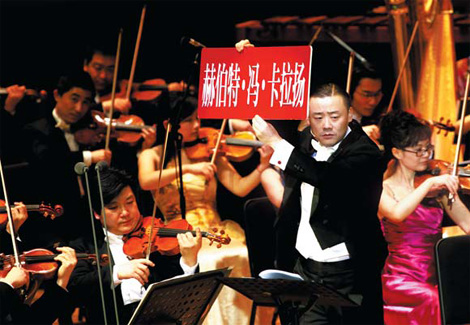Comedian Zhou Libo in a class of his own
 |
|
Zhou Libo cooperates with the China Philharmonic Orchestra for his Beijing debut. [China Daily] |
Stand-up comedian Zhou Libo's Beijing debut was a success, although many people had previously questioned whether his Shanghai-style humor would suit northerners.
At this performance, with the China Philharmonic Orchestra, Zhou gave light-hearted introductions to the various instruments and sections of the orchestra, mingled with his witty observations about social phenomena and a benign joke about Beijing's most popular cross-talk comedian, Guo Degang.
Language was not a barrier as Zhou used standard Chinese throughout the show, forsaking the Shanghai dialect that is used in most of his Shanghai performances.
That city's newspapers reported the Beijing audience laughed 450 times during the show. That might be a bit of an exaggeration, but it is true to say that what tickles Shanghai's funny bone, also tickles the capital city.
What differentiates Zhou from Guo, or from northeastern China's greatest comedian, Zhao Benshan, is not only regional culture, but more importantly, the groups of people they represent. If Zhao's humor belongs to farmers and Guo's to the urban poor, Zhou's humor speaks to China's emerging middle class.
Former chairman Mao Zedong said "there is no human nature above classes". Perhaps, we can also say that there is no humor above classes.
Zhou refused an earlier invitation to do a show with Guo for the reason that, "It is impossible for a coffee drinker to mingle with a garlic eater".
There are probably more garlic eaters in Beijing than in Shanghai, but coffee is as popular with Beijing's Westernized middle class as Shanghai's. Zhou's remark basically demonstrates a division of classes.
No doubt the audience that showed up at the recent Beijing performance were mostly coffee drinkers. Deeming Zhao's jokes to be too shallow and Guo's too vulgar, they responded enthusiastically to Zhou's jokes about Tiger Woods, the stock market and mortgages, in much the same way as Zhou's audiences in Shanghai.
The theme of the performance - symphony music - is itself a topic of the middle class. Zhou said he has been a lover of Western classical music for a long time. If not for the invitation of the China Philharmonic Orchestra, he probably wouldn't have so easily broken his promise to never cross the Yangtze River and perform in North China.
Zhou knows what his audience wants. China's middle class sees classical music as a status symbol, though they may not really understand it.
Zhou's comparison of a violin to a woman, the viola to a middle-aged person, and the woodwind section to white-collar workers, made it easy for the audience to grasp their roles.
But Zhou is at his best when satirizing current affairs. Thus, his joke about people swarming to old-age homes to show their sympathy, during festivals, received the most applause.
What else do China's middle class talk about besides classical music, housing and the stock market?
The Southern Weekend ran a story titled, "Zhao Benshan does not have to talk about politics, but Zhou Libo does", indicating that Zhou is better than Zhao because he can do more.
Zhou, however, said that he has no interest in politics, except when it becomes current affairs, which he does care about.
On stage, Zhou has ridiculed French President Nicolas Sarkozy, mocked the former leader of Taiwan Chen Shui-bian, and mimicked the tones and facial expressions of Chinese Premier Wen Jiabao. Even so he is careful, and at the Beijing performance he did not tell a mildly political joke that he had rehearsed.
One of the most impressive parts of the show was Zhou's interpretation of a harmonious society based on his explaining of "he" and "xie", the two characters that make up the Chinese word for "harmonious". He consists of the radicals for "crop" and for "mouth"; while xie has one part for "speech" and the other for "all" - put together, a harmonious society is when "all people have food to eat and speeches to make", Zhou said.
It is foreseeable that more comedians like Zhou will appear, as the growing middle class needs more humor that speaks to them - as everybody else does. Gone is the time when all humor must serve the proletariat. If you don't believe me, listen to some cross-talk works from the "cultural revolution" (1966-76), and you'll find they really are not funny, any more.
 0
0 







Go to Forum >>0 Comments